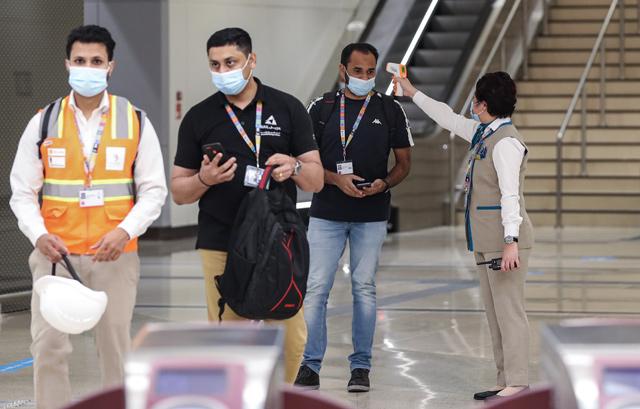- International News
- Web-2020-09-02 | 03:15 pm

Qatar resumed bus and rail services on Tuesday for the first time since March, with reduced capacity and tough restrictions to limit the risk of coronavirus spreading between passengers.
At Doha’s main Msheireb metro station, staff took travellers’ temperatures and inspected their mandatory contact-tracing apps as they headed to the platforms.
The metro is limited to 30 per cent capacity, but AFP correspondents saw that uptake was far short of that on the first day of restored service.
"It’s all for our safety so I think it’s good,” said Sri Lankan migrant worker Rajin as he rushed for a train into the city centre.
Qatar, home to 2.75 million people, has been faced with the world’s highest per-capita caseload, with 188,994 infections since the beginning of the pandemic.
Officials say the high rate is due to widespread testing, and stress that only 198 people have died of the disease so far.
On metro trains, alternate seats were blocked and standing areas were marked with stickers to promote social distancing.
"All the people are keeping their distance, it’s good now and it’s safe,” said Sudanese worker Hassan.
Previously a regular user of Doha’s metro system, he who was travelling with his mother on a service linking the Lusail and Al Janoub World Cup stadiums.
Paper tickets have also been scrapped to encourage passengers to adopt reusable travel cards that can be topped up online, limiting the use of touchscreen ticket machines where the virus could be transmitted.
Several customers were turned away from the network when they were unable to present their contact tracing apps, staff said.
"It’s slow because maybe not all the people know it’s reopened,” said Christina, a barista at a cafe on the concourse of Doha’s Exhibition and Convention Centre station.
Alongside the resumption of metro and some bus services, all of the Muslim country’s mosques will be permitted to open for Friday prayers subject to capacity restrictions and social distancing rules.
Schools will be permitted to re-open from September with a maximum of 30 per cent of students present at any one time on a rotating basis.
"The phased approach to lifting restrictions has worked very well,” the health ministry said in a statement.
"While we have seen small clusters of cases as a result of people not adhering to the preventative measures, we have not yet seen signs of a second wave.”
Qatar has reported 214 new daily cases on average over the past seven days, compared to 262 for the previous week.













